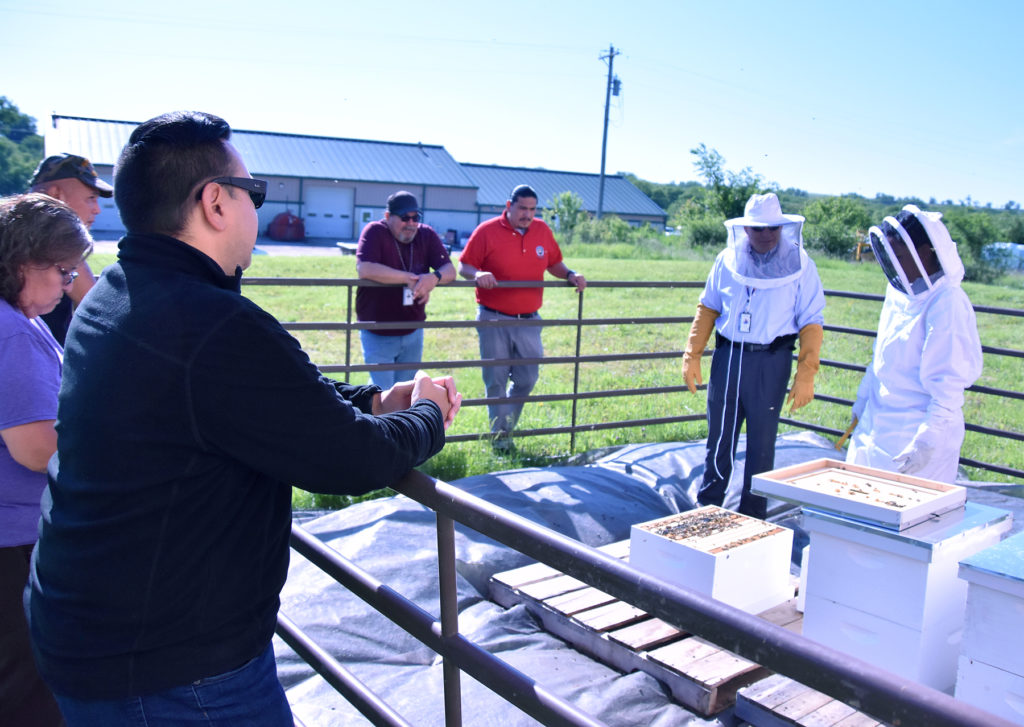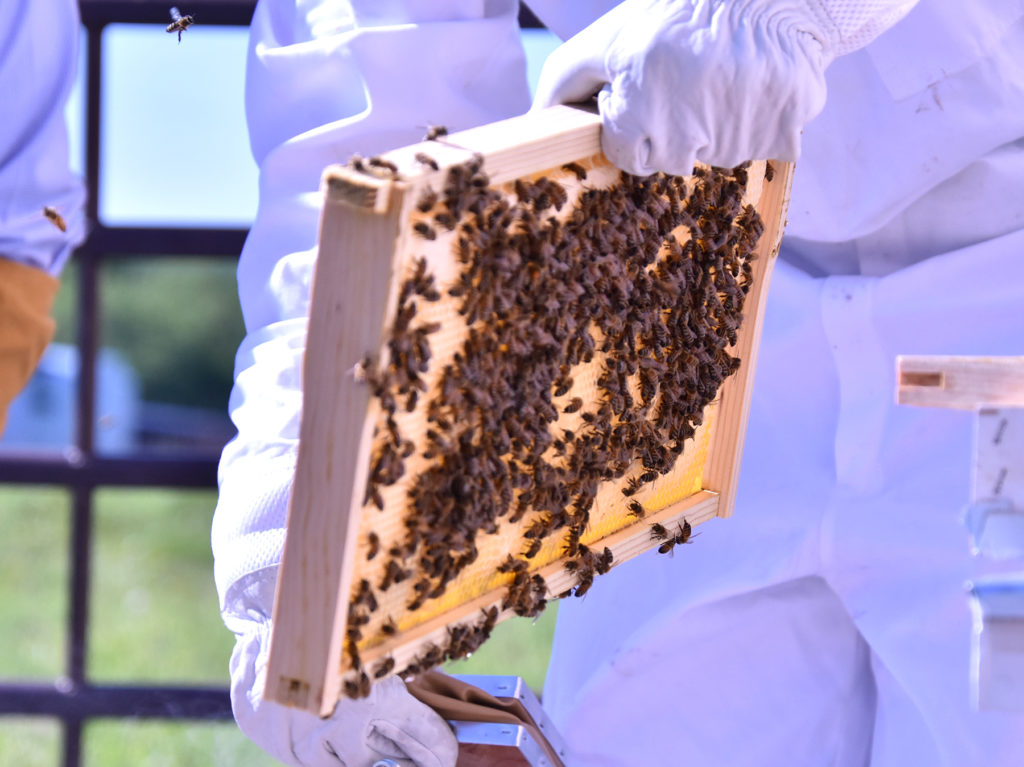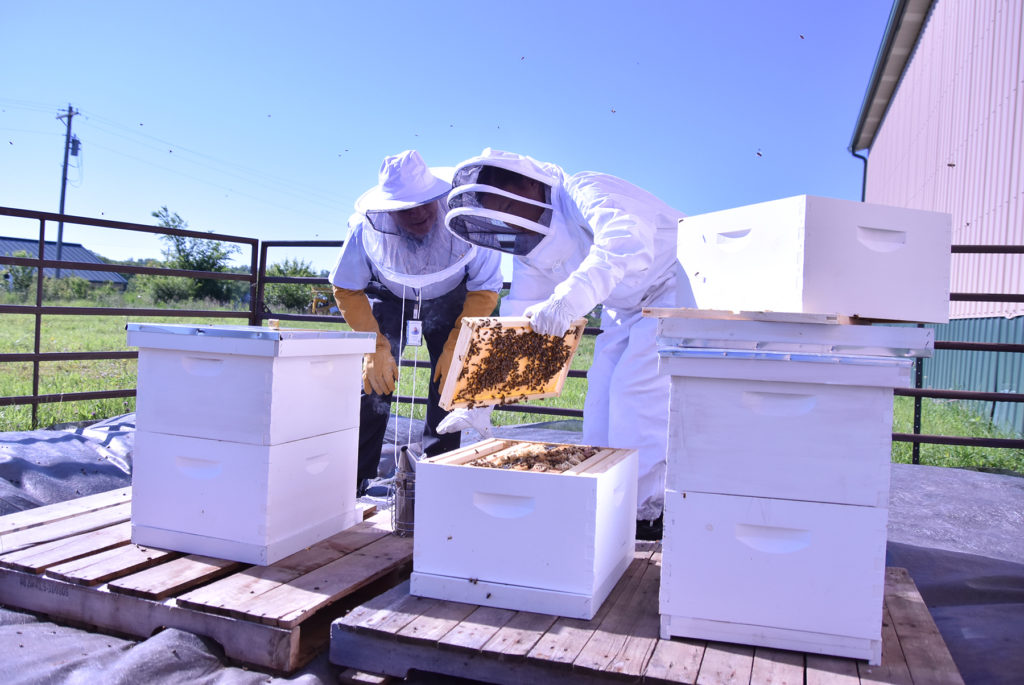
- Details
- By PBPN News
MAYETTA, Kan. — The Potawatomi Nation is known as the "Keepers of the Fire," and approximately three weeks ago the Prairie Band Potawatomi Nation (PBPN) became keepers of the bees. The PBPN Planning and Environmental Protection (PEP) program recently installed three brood boxes at the Land Maintenance complex, across the road from the Nation’s orchard located on K road. The new hives which each consist of roughly 10,000 bees are the tribe’s initial introduction to beekeeping. This new endeavor is off to a good start and it is anticipated that it will continue to grow and thrive and potentially become an economic resource in the future.
Virginia LeClere, PEP program Manager is leading the new bee initiative following a directive from the PBPN Tribal Council. LeClere and another PEP staff member, Chris Sims, attended Johnson County Community College (JCCC) Beekeeping I, II, and III, a 6-week training that prepares novice beekeepers on the ins and outs of bee maintenance prior to establishing the new colony. Staff plans to attend additional classes through JCCC in the fall to train on honey harvesting, wintering bees, and proper treatment of mites, moths, and diseases that can challenge healthy hives.
Along with the bees settling into their own community, a few members of the local Prairie Band community have also come forward to provide their hands-on knowledge regarding beekeeping. Food Distribution (Commodities) program manager Blake Garrison, Building Maintenance staff Kevin Throssell, and tribal member Richard Adame have all kept bees successfully and were happy to lend their expertise to the project.
The PBPN Tribal Council recognizes both the critical decline in the bee population and the essential impact bees make on the environment and felt now was an important time to include them as a component of the Nation’s resources.
Bees are vital pollinators with approximately 90 percent of all plants including trees requiring cross-pollination to flourish. Bees excel at helping plants grow, breed, and produce foods which furthers sustainable food systems for other insects, birds, animals and humans. The community is encouraged to respect the bees and their hives. Should anyone encounter a swarm, natural hive or brood boxes, do not disturb them.
Language Learning Tip: The Potawatomi word for bee is amo (äh-mō).
Editor's Note: This article was first published by the Prairie Band Potawatomi Nation News. Used with permission. All rights reserved.
More Stories Like This
Native News Weekly (August 25, 2024): D.C. BriefsUS Presidents in Their Own Words Concerning American Indians
Happy Thanksgiving from Native News Online
Coming Up on Native Bidaské: Behind the Animation: Joey Clift Talks “Pow” and Native Storytelling
Two West Virginia Guardsmen Shot Near White House
Help us tell the stories that could save Native languages and food traditions
At a critical moment for Indian Country, Native News Online is embarking on our most ambitious reporting project yet: "Cultivating Culture," a three-year investigation into two forces shaping Native community survival—food sovereignty and language revitalization.
The devastating impact of COVID-19 accelerated the loss of Native elders and with them, irreplaceable cultural knowledge. Yet across tribal communities, innovative leaders are fighting back, reclaiming traditional food systems and breathing new life into Native languages. These aren't just cultural preservation efforts—they're powerful pathways to community health, healing, and resilience.
Our dedicated reporting team will spend three years documenting these stories through on-the-ground reporting in 18 tribal communities, producing over 200 in-depth stories, 18 podcast episodes, and multimedia content that amplifies Indigenous voices. We'll show policymakers, funders, and allies how cultural restoration directly impacts physical and mental wellness while celebrating successful models of sovereignty and self-determination.
This isn't corporate media parachuting into Indian Country for a quick story. This is sustained, relationship-based journalism by Native reporters who understand these communities. It's "Warrior Journalism"—fearless reporting that serves the 5.5 million readers who depend on us for news that mainstream media often ignores.
We need your help right now. While we've secured partial funding, we're still $450,000 short of our three-year budget. Our immediate goal is $25,000 this month to keep this critical work moving forward—funding reporter salaries, travel to remote communities, photography, and the deep reporting these stories deserve.
Every dollar directly supports Indigenous journalists telling Indigenous stories. Whether it's $5 or $50, your contribution ensures these vital narratives of resilience, innovation, and hope don't disappear into silence.
 The stakes couldn't be higher. Native languages are being lost at an alarming rate. Food insecurity plagues many tribal communities. But solutions are emerging, and these stories need to be told.
The stakes couldn't be higher. Native languages are being lost at an alarming rate. Food insecurity plagues many tribal communities. But solutions are emerging, and these stories need to be told.
Support independent Native journalism. Fund the stories that matter.
Levi Rickert (Potawatomi), Editor & Publisher


